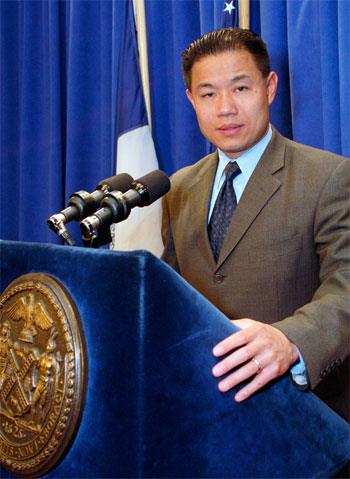

LIU: STATE MINIMUM-WAGE HIKE COULD HARM LOW-WAGE WORKERS IN NEW YORK CITY
Renews Call for $11.50-per-Hour Rate on 'National Day of Action'
A "perverse incentive" enacted together with the minimum-wage increase in the New York State budget could jeopardize the pay or even the jobs of low-wage workers in New York City, a report released by City Comptroller John C. Liu is warning. Comptroller Liu renewed his call to implement an $11.50-per-hour minimum wage in New York City, which would make employers ineligible for this harmful tax credit and help many more workers make ends meet in the most expensive major city in the nation.
"State lawmakers did their best to craft a minimum-wage hike that would help workers in Rochester and Buffalo, but a tax credit for employers they included as part of that deal may actually harm low-wage New York City workers," Comptroller Liu said. "That's yet another good reason why we need to raise the New York City minimum wage to $11.50 an hour. Not to mention that New York City is just so much more expensive to live in."
Liu's report comes out as the United States marked the fourth anniversary of the last rise in the federal minimum wage, which activists have named as a "National Day of Action to Raise Up America," calling on elected officials and employers to raise wages for the nation's lowest-paid workers.
The "Minimum Wage Reimbursement Credit" included in the New York State budget gives businesses tax credits if they hire young workers, but employers only get the credit if they pay their workers exactly the minimum wage and not a penny more. Employers would receive a $1.35-per-hour tax credit for each worker between the ages of 16 and 19 earning no more than the minimum wage of $9.00 per hour in 2016. This could jeopardize the jobs and wages of roughly 120,000 New York City workers making between $9.00 and $10.00 per hour, because the state would pay their employers to replace them with workers earning minimum wage.
"New York should be a city where working men and women can afford to make ends meet," said Comptroller Liu. "If we are serious about helping families with children climb out of poverty, narrowing the wealth gap, and growing the middle class, we need to have the courage to pay all people a livable minimum wage of $11.50. Let's not ignore the fact that the federal minimum wage created decades ago has not kept up with inflation; if it had, today's federal minimum wage would be more than $10.50. Contrary to what many in corporate America would have us believe, sound economic research indicates that a New York City minimum wage of $11.50 will help, not hurt, the Big Apple's economy."
Census data show that most low-wage workers in New York City are not young people on a path towards higher education and higher-earning careers. Rather, workers earning less than $11.50 per hour are largely over age 25, not in school, and lack a college degree.
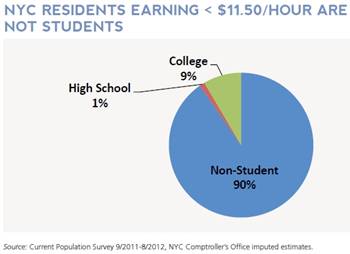
According to the report, an $11.50-per-hour minimum wage would lift roughly 200,000 New York City residents out of poverty and increase the wages of 450,000 workers by $3.08 per hour on average. This would put about $2.4 billion into the pockets of low-wage workers each year and likely cause an even larger rise in consumer spending.
About 875,000 City residents are considered working poor based on federal guidelines, and workers earning well above $9.00 per hour are still likely to live in poverty. Because of the high cost of living in New York City, the effective minimum wage is currently $4.00 per hour — the lowest in the nation. A $9.00 rate would raise the effective minimum wage to $4.97, a substantial improvement but still not enough to live on in New York City.
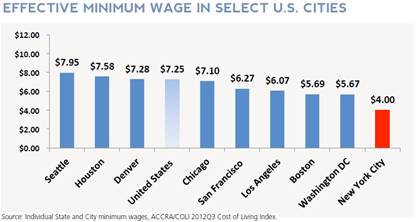
New York City's working poor are disproportionally Hispanic and black and living in the outer boroughs. Almost 400,000 Hispanic New York City residents live in working poor households, as do nearly 200,000 black residents. Additionally, 29 percent of working residents in The Bronx earn less than $11.50 per hour, compared to less than 13 percent of working Manhattanites.
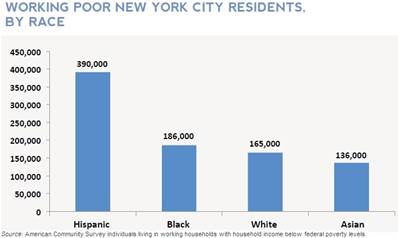
The buying power of the federal minimum wage has been eroded by inflation and is low by historical standards. The federal minimum wage began to lag behind the cost of living in New York City beginning in the 1980s, a trend that has continued to the present day. In fact, in the four years since the federal government last raised the minimum wage, inflation has reduced its real value by nearly 9%. The report recommends indexing New York City's minimum wage to inflation in order to ensure that workers do not lose out as costs rise.
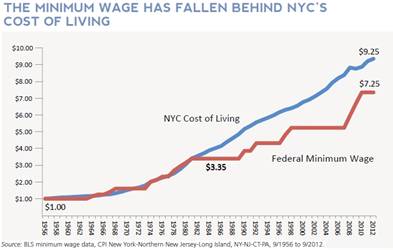
Background
The report uses U.S. Census data from the Current Population Survey and cost of living data from the Council for Community and Economic Research's ACCRA/COLI index to analyze the wages of low-income workers in New York City and make cost of living comparisons.
The current minimum wage in New York City is $7.25 per hour — equal to the federal minimum wage because there is no New York City-specific minimum and the New York State boost from $7.25 to $9.00 will not begin to be phased in until 2014.
Liu statement on New York State minimum wage legislation – March 19, 2013:
http://comptroller.nyc.gov/press/2013_releases/pr13-03-042.shtm
Liu applauds President Obama's federal minimum wage proposal – February 13, 2013:
http://www.comptroller.nyc.gov/press/2013_releases/pr13-02-030.shtm
Liu applauds Governor Cuomo's minimum wage proposal – January 9, 2013:
http://www.comptroller.nyc.gov/press/2013_releases/pr13-01-005.shtm
Liu proposes an $11.50 per hour minimum wage during his State of the City address – December 20, 2012: http://www.youtube.com/watch?v=NeZIUGDaSzA&feature=youtu.be
Liu's income inequality in NYC report – May 21, 2012: http://www.comptroller.nyc.gov/bureaus/opm/reports/2012/NYC_IncomeInequality_v17.pdf
